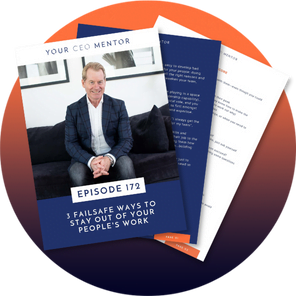With Martin G. Moore

When one of my articles for HBR blew up recently on social media, we decided to make it more accessible to our community of No Bullsh!t Leaders by turning it into a podcast episode. And because I don’t have a word limit here, I can expand it out and offer examples until my heart’s content!
When you first move into a leadership role, it’s easy to develop bad habits… one of those habits is over-functioning for your people: doing their work for them. We think we’re doing it for all the right reasons and it’s easy to rationalize. But it’s also the surest way to weaken your team, limit its potential, and constrain its culture.
In this episode I briefly touch upon the transition from individual contributor to people leader, explore why we love to do our people’s work for them, and give you three surefire ways to build the discipline to let your people do their jobs, without your well-meaning but unhelpful intervention!
DOWNLOAD YOUR FREE COPY OF:
THE 3 FAILSAFE WAYS TO STAY OUT OF YOUR PEOPLE’S WORK

Get yours delivered straight to your inbox by filling out the form below 👇
Transcript
I wrote an article for Harvard Business Review, which was published in November. Em shared it in my LinkedIn feed, as she does, and it went a little nuts. We had over a hundred thousand views in the first day or so, and it was shared dozens and dozens of times, clearly it struck a chord with our leadership community everywhere from New York City to London, and Delhi to Sydney. Given the popularity of the topic, Em and I decided to produce a podcast episode covering the key concepts. Of course, because I don’t have a word limit here, I can expand it out and offer examples until my heart’s content.
When you first move into a leadership role, it’s easy to develop bad habits. One of those habits is over-functioning for your people, doing the work for them. We think we’re doing it for all the right reasons, and it’s easy to rationalise – but it is the surest way to weaken your team, limit its potential and constrain its culture.
I’m going to open today by briefly exploring the transition from individual contributor to leader.
I’ll run through some of the reasons why we do our people’s work for them, and why that’s a problem.
I’ll finish with three surefire ways to stop you from doing people’s work and to do your own instead.
So let’s get into it.
The transition to your first leadership role can be tricky. If your first move was anything like mine, you probably received very little guidance on what was supposed to be different, how your role had changed and what expectations were going to be placed upon you. If you’re going through the transition now, or you haven’t spent too long in a leadership role, I’m sure you’re going to find this episode incredibly useful. But for many of you, this transition is but a distant memory, a threshold you crossed so many years ago that you’ve forgotten how it felt and what it entailed. If that’s you, then I really encourage you to use this episode as a valuable reminder and a guide to helping your up and coming leaders to handle this transition more comfortably.
Don’t make the mistakes your boss has made. Help your people through this transition so that they don’t develop too many bad habits too early on. Help them to start off on the right foot as leaders. If there are multiple is between you and your newest leaders, you should take this really seriously and make it an organisational construct. Perhaps even bake a category into your performance leadership standards to ensure that the leaders below you are giving sufficient attention to developing the talent that they’re entrusted to lead.
When I first made the step up to leadership, no one ever really told me what my job was. It was a case of “Uh, look after these people, here are your deliverables, and now you should probably come to this weekly meeting.” So I had to make it up as I went along, like so many of us do. What did I do? Well, I led the way I was led – with my own particular style, of course – but not a great idea. One of my biggest problems was that I was excellent at my technical work.
making the transition from individual contributor to leader
I don’t talk about this much, but I’m gonna give you a little window into my first career. I was developing software for big business: working in rooms with teams of analysts and programmers, but in a very structured fashion – Silicon valley, it wasn’t! It was the complex multi-user programming that was the leading edge to the banking systems of the 1980s and 90s, with realtime response and billions of bytes of data. Looking back now, it was virtually prehistoric. Back then each of the massive storage units that held the mainframe’s data had only 5% of the capacity of the Mac Mini sitting on the desk in front of me today. But the environment was complex and the intellectual challenge was invigorating.
Now, because I was smart and I was a fast learner, I was promoted fairly quickly. Why? Well, of course, on the basis of my technical competence and probably the fact that I could string a decent sentence together. Here’s the interesting thing: I thought my job was to lift the standard of the team, to my standard and turn out elegant, perfectly functioning code. When any of my team members didn’t do the job the way I would’ve done it myself, guess what I did? I corrected their work. I would rewrite their code.
This reminds me of the Foo Fighters documentary called Back and Forth. It’s a great doco, if you haven’t seen it. In it, they tell the story of the band’s first drummer, Will Goldsmith. They were recording the band’s second album, which was titled The Colour and The Shape. Dave Grohl, who was the founder of the Foo Fighters and the former drummer of groundbreaking grunge band, Nirvana, had transitioned to front man. He was the Foo Fighters lead singer and guitarist. Goldsmith tells a story of what a perfectionist Dave Grohl was.
He made Goldsmith record an unbelievable number of takes for every track on one occasion, even spending 13 hours straight doing the drum track for a single song. After all of that, when the album was in post-production, Grohl decided he still wasn’t happy. So he rerecorded all the drum tracks himself without telling Goldsmith. You can imagine how Goldsmith felt when he found out. He left the band immediately, paving the way for current drummer, Taylor Hawkins. Just think for a moment how that must feel. You’re a professional, trying to do your best work and make a mark on the world. Then your boss says, “That’s not good enough, but I’ll still keep you around. I’ll just step in when I feel I need to.” Not very cool.
Of the many mistakes that new leaders are prone to make, this is one of the most insidious. Over-functioning for your people tells them that what they’re doing isn’t good enough. It trains them to accept that you’ll always step in and finish their job for them if anything goes wrong. And if they don’t feel like working to the best of their ability, well, that’s fine. You’ll make it right, and they’ll keep getting paid for not doing their job to the standard you expect. Your job is not to do your team’s work for them. It’s to build a team of people who can do their jobs independently. You’re there to liberate their talent and get the best performance from them that you possibly can.
why do leaders over-function?
Let’s face it – over-functioning is comfortable. You are playing in a space where you are competent, unlike your embryonic leadership capability. You most likely see your market value and identity in your technical role. Ironically, I could have made a lot of money in my early years working in sales functions, and I rejected a number of job offers because my professional identity was a highly skilled and competent analyst programmer. Much more prestigious than a salesperson, right? If only I knew then what I know now.
So doing your people’s work enables you to keep your technical skills up to date and you can be seen as first amongst equals when it comes to your knowledge, capability and expertise. It’s so easy to rationalise this approach too. I always get the job done. I lead by example. I’m always there for my team. This is such bullshit. It you’re doing your team’s work because it’s easy, it’s comfortable and you don’t need to break any bad habits. And what’s the alternative? Well, it’s leadership work:
Passing on your skills and expertise to others, which weakens your perceived expert power.
Holding people to account for doing their job to the proper standard.
Helping them to learn rather than showing them how good you are.
Taking the time to let them develop and grow building team capability so that it can function with or without you.
But if you choose to step away from this and do leadership work well, that’s uncertain and it’s risky. The team when left to its own devices may not deliver to the same standard that you would have. As a consequence of this, you may need to have conversations that you’d rather not have. Telling people that what they’re doing isn’t quite right, risking the fact that they might not like you, if that’s the message they need to receive; having to make hard decisions about what to do with the people who don’t perform, even with all your guidance and effort. It’s infinitely easier to just roll your sleeves up than it is to lead your people to deliver to the acceptable standard. But the higher up you go, the less effective that strategy is for doing your people’s work. At some point, you just have to bite the bullet and let go.
the problem with doing your people’s work
At the risk of being a little repetitive, I want to be really clear on the problems that arise when you do your people’s work for them. So, here are the eight main points in summary:
1. Your people don’t grow
Their growth is stunted because you don’t let them learn by making their own mistakes and solving their own problems. There’s a lot to be said for allowing people to crash and burn – in a nonfatal way, of course. The lessons learned in the tougher situations are ones you neither forget, nor repeat. Without this, people become weak and dependent problem.
2. You set a low standard for performance
You’re not setting the standard by what you do – you’re setting the standard by what you allow. Your team never really understands the difference. They deliver to a lower standard than you want, but they never see or feel the consequences of this. If they can keep performing as they do, and you don’t do anything to change their perception, they could be forgiven for thinking that they’re performing at an acceptable level.
3. There’s no real pressure on your people to deliver
This is closely aligned with Number Two. If they don’t have to do it, they won’t – life is good. Bringing performance pressure to bear is fundamental to people’s sense of satisfaction in their work. If there’s no stretch, there’s no sense of achievement.
4. Your people will feel untrusted and unappreciated
Like Dave Grohl rerecording Will Goldsmith drum tracks, you’re telling people that they’re not good enough. But in a sort of passive aggressive way, where the mixed messages of redoing their work, but still employing them, leaves them confused and demotivated.
5. You can’t build team capability
Your job as a leader is to build capability below you. It’s okay that you can do the job better than your team members – but who’s the next You who will take over? When you do your people’s work for them, you are doing the organisation, a disservice by not providing for the future. You’re building a risk into the organisation that no leader should.
6. The team becomes dependent on you in order to function
Following on from the previous point, when you don’t build capability, you build dependence. When you build dependence, you’re effectively shooting yourself in the foot. As long as you are pivotal in your team’s performance, your boss will be reluctant to move you anywhere else.
7. You never see what people are capable of achieving
I’m always amazed at how people can step up, when you demand it of them. It’s incredible what can be accomplished when you help someone go beyond their comfort zone, and give them that sense of achievement. But not everyone’s gonna do this as I’m sure you’ve already worked out. The trick is you never know who’s gonna step up and who isn’t until you ask them to.
8. Every minute you spend doing your team’s work is a minute you don’t spend doing your own
By doing your own, I mean, making the objectives crystal clear, exploring how to maximise value, and to efficiently execute on that. Helping your people to understand what they need to achieve and supporting them to do it: resourcing them appropriately and making sure the targets you set are reasonable; course correcting when they go slightly off centre; holding them to account when they choose not to meet the standard your setting. That’s the work of leadership.
three disciplines of leadership work
How do you discipline yourself to stay out of your people’s work? I want you to take note here, there are three things, and we’ve put together a downloadable for you.
1. Don’t play the game, keep the score
You’re not the captain – you’re the coach. You’re not on the playing field, playing the game with them, even though you could. Not your job! Your job is to devise a winning strategy to coach, mentor, and motivate your people to reach their peak; to show them the scoreboard, make sure they know how to make the score move – and when the score isn’t moving, to work out why. To set clear expectations and strong accountabilities, and to bring everyone into the huddle when things change or when you need to regroup.
2. Ask the right questions
The most important question is the one you ask of yourself. When someone isn’t doing the job the way you’d ideally like, just ask yourself this one simple question:
What’s the best thing I can do right now to help this person succeed?
This is a really powerful question, and it opens the door to asking other questions of them. For example:
What do you thinks at the core of this issue?
Have you thought about alternative approaches?
What can we sacrifice without eroding or diluting value?
Who can you talk to to get a different perspective?
It’s these coaching moments that matter most.
3. Think long term
One of the biggest problems with doing people’s jobs for them is that this approach can’t possibly succeed in the longer term. As a short term strategy, sure. It’s fast and it’s easy, and it helps you avoid the hard work of leadership – but what happens tomorrow? Exactly the same thing. You’re building dependence, not capability. This grows exponentially over time, imprisoning you in your very own Groundhog day. You actually become a workhorse. You’re essential to the successful functioning of your team. As I said before, as long as you’re doing that, your bosses are going be really reluctant to move you anywhere else. Your instinct shouldn’t be to create a dependency on you that makes you indispensable. It should be to make yourself redundant.
The bottom line is you can only get so far on your own individual brilliance. Sure, you can give 10% more effort individually, but this is nowhere near as smart, powerful, or effective as getting 10% more out of every single person on your team. So, build a great team! Expect them to step up and do their jobs. When they don’t, you need to lead them, both individually and collectively. Once you’ve built that great team that can deliver even without your firm-handed oversight, that’s when you’re free to be promoted and go on to build another team, and another.
RESOURCES AND RELATED TOPICS:
Read Stop Doing Your Team’s Work in Harvard Business Review – Here
Buy the NO BULLSH!T LEADERSHIP BOOK – Here
Explore other podcast episodes – Here
Take our FREE Level Up Leadership Masterclass – Start Now
Leadership Beyond the Theory – Learn More
YOUR SUPPORT MATTERS
Here’s how you can make a difference:
Subscribe to the No Bullsh!t Leadership podcast
Leave us a review on Apple Podcasts
Repost this episode to your social media
Share your favourite episodes with your leadership network
Tag us in your next post and use the hashtag #nobsleadership


